Entrepreneurship and Small Business Management Report - H1003618
VerifiedAdded on 2022/02/14
|17
|4433
|18
Report
AI Summary
This report, prepared by Azom Ali (H1003618), delves into the multifaceted world of entrepreneurship and small business management. It begins by exploring different types of entrepreneurial ventures, including small business, scalable startups, large company, and social entrepreneurship, and examines their relationship to the typology of entrepreneurship. The report then explores the similarities and differences between lifestyle and social entrepreneurship. Subsequently, it assesses the impact of micro and small businesses on the UK economy, supported by relevant data and statistics, and explains the importance of these businesses to the growth of the social economy. The report also determines the key characteristics and skills of successful entrepreneurs, differentiating them from other business managers, and assesses how entrepreneurial personality reflects motivation and mindset. Finally, it examines the environments that foster or hinder entrepreneurship by considering how background and experience can influence entrepreneurs. The report provides a comprehensive analysis of entrepreneurial ventures, their impact, and the factors that contribute to success, referencing key academic sources throughout.

Unit 9: Entrepreneurship and Small Business Management
Student Name: Azom Ali
Student ID: H1003618
1
Student Name: Azom Ali
Student ID: H1003618
1
Paraphrase This Document
Need a fresh take? Get an instant paraphrase of this document with our AI Paraphraser
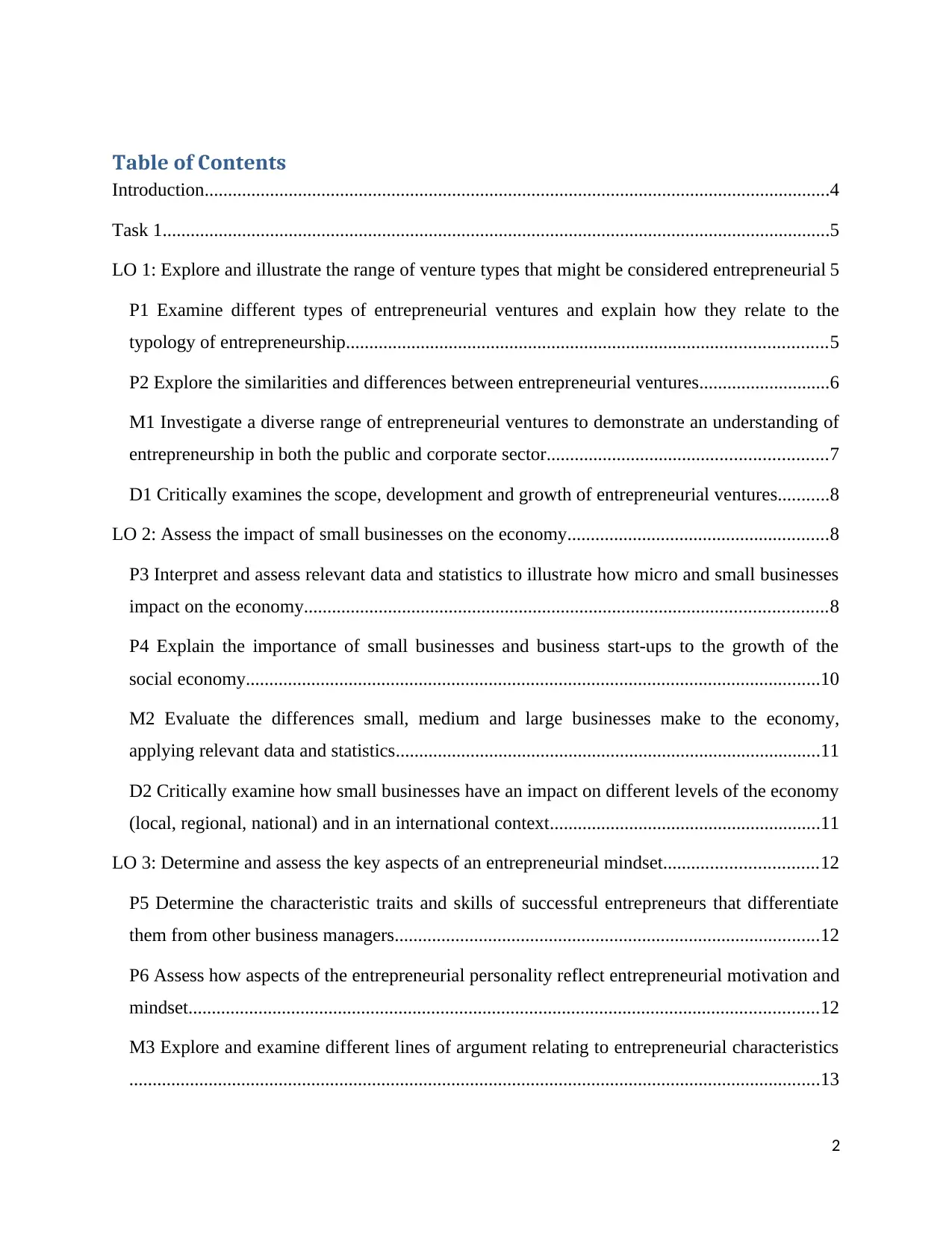
Table of Contents
Introduction......................................................................................................................................4
Task 1...............................................................................................................................................5
LO 1: Explore and illustrate the range of venture types that might be considered entrepreneurial 5
P1 Examine different types of entrepreneurial ventures and explain how they relate to the
typology of entrepreneurship.......................................................................................................5
P2 Explore the similarities and differences between entrepreneurial ventures............................6
M1 Investigate a diverse range of entrepreneurial ventures to demonstrate an understanding of
entrepreneurship in both the public and corporate sector............................................................7
D1 Critically examines the scope, development and growth of entrepreneurial ventures...........8
LO 2: Assess the impact of small businesses on the economy........................................................8
P3 Interpret and assess relevant data and statistics to illustrate how micro and small businesses
impact on the economy................................................................................................................8
P4 Explain the importance of small businesses and business start-ups to the growth of the
social economy...........................................................................................................................10
M2 Evaluate the differences small, medium and large businesses make to the economy,
applying relevant data and statistics...........................................................................................11
D2 Critically examine how small businesses have an impact on different levels of the economy
(local, regional, national) and in an international context..........................................................11
LO 3: Determine and assess the key aspects of an entrepreneurial mindset.................................12
P5 Determine the characteristic traits and skills of successful entrepreneurs that differentiate
them from other business managers...........................................................................................12
P6 Assess how aspects of the entrepreneurial personality reflect entrepreneurial motivation and
mindset.......................................................................................................................................12
M3 Explore and examine different lines of argument relating to entrepreneurial characteristics
....................................................................................................................................................13
2
Introduction......................................................................................................................................4
Task 1...............................................................................................................................................5
LO 1: Explore and illustrate the range of venture types that might be considered entrepreneurial 5
P1 Examine different types of entrepreneurial ventures and explain how they relate to the
typology of entrepreneurship.......................................................................................................5
P2 Explore the similarities and differences between entrepreneurial ventures............................6
M1 Investigate a diverse range of entrepreneurial ventures to demonstrate an understanding of
entrepreneurship in both the public and corporate sector............................................................7
D1 Critically examines the scope, development and growth of entrepreneurial ventures...........8
LO 2: Assess the impact of small businesses on the economy........................................................8
P3 Interpret and assess relevant data and statistics to illustrate how micro and small businesses
impact on the economy................................................................................................................8
P4 Explain the importance of small businesses and business start-ups to the growth of the
social economy...........................................................................................................................10
M2 Evaluate the differences small, medium and large businesses make to the economy,
applying relevant data and statistics...........................................................................................11
D2 Critically examine how small businesses have an impact on different levels of the economy
(local, regional, national) and in an international context..........................................................11
LO 3: Determine and assess the key aspects of an entrepreneurial mindset.................................12
P5 Determine the characteristic traits and skills of successful entrepreneurs that differentiate
them from other business managers...........................................................................................12
P6 Assess how aspects of the entrepreneurial personality reflect entrepreneurial motivation and
mindset.......................................................................................................................................12
M3 Explore and examine different lines of argument relating to entrepreneurial characteristics
....................................................................................................................................................13
2
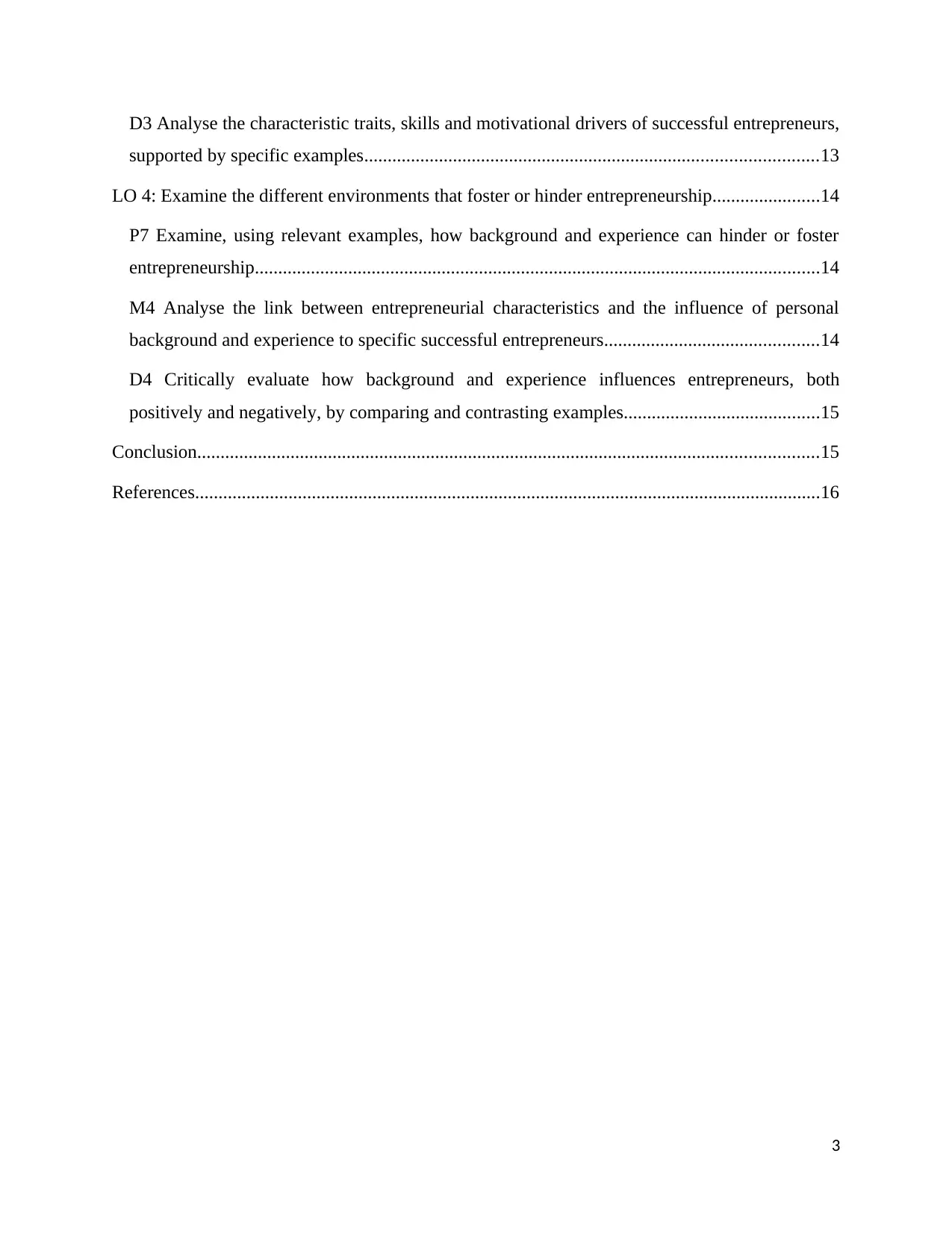
D3 Analyse the characteristic traits, skills and motivational drivers of successful entrepreneurs,
supported by specific examples.................................................................................................13
LO 4: Examine the different environments that foster or hinder entrepreneurship.......................14
P7 Examine, using relevant examples, how background and experience can hinder or foster
entrepreneurship.........................................................................................................................14
M4 Analyse the link between entrepreneurial characteristics and the influence of personal
background and experience to specific successful entrepreneurs..............................................14
D4 Critically evaluate how background and experience influences entrepreneurs, both
positively and negatively, by comparing and contrasting examples..........................................15
Conclusion.....................................................................................................................................15
References......................................................................................................................................16
3
supported by specific examples.................................................................................................13
LO 4: Examine the different environments that foster or hinder entrepreneurship.......................14
P7 Examine, using relevant examples, how background and experience can hinder or foster
entrepreneurship.........................................................................................................................14
M4 Analyse the link between entrepreneurial characteristics and the influence of personal
background and experience to specific successful entrepreneurs..............................................14
D4 Critically evaluate how background and experience influences entrepreneurs, both
positively and negatively, by comparing and contrasting examples..........................................15
Conclusion.....................................................................................................................................15
References......................................................................................................................................16
3
⊘ This is a preview!⊘
Do you want full access?
Subscribe today to unlock all pages.

Trusted by 1+ million students worldwide
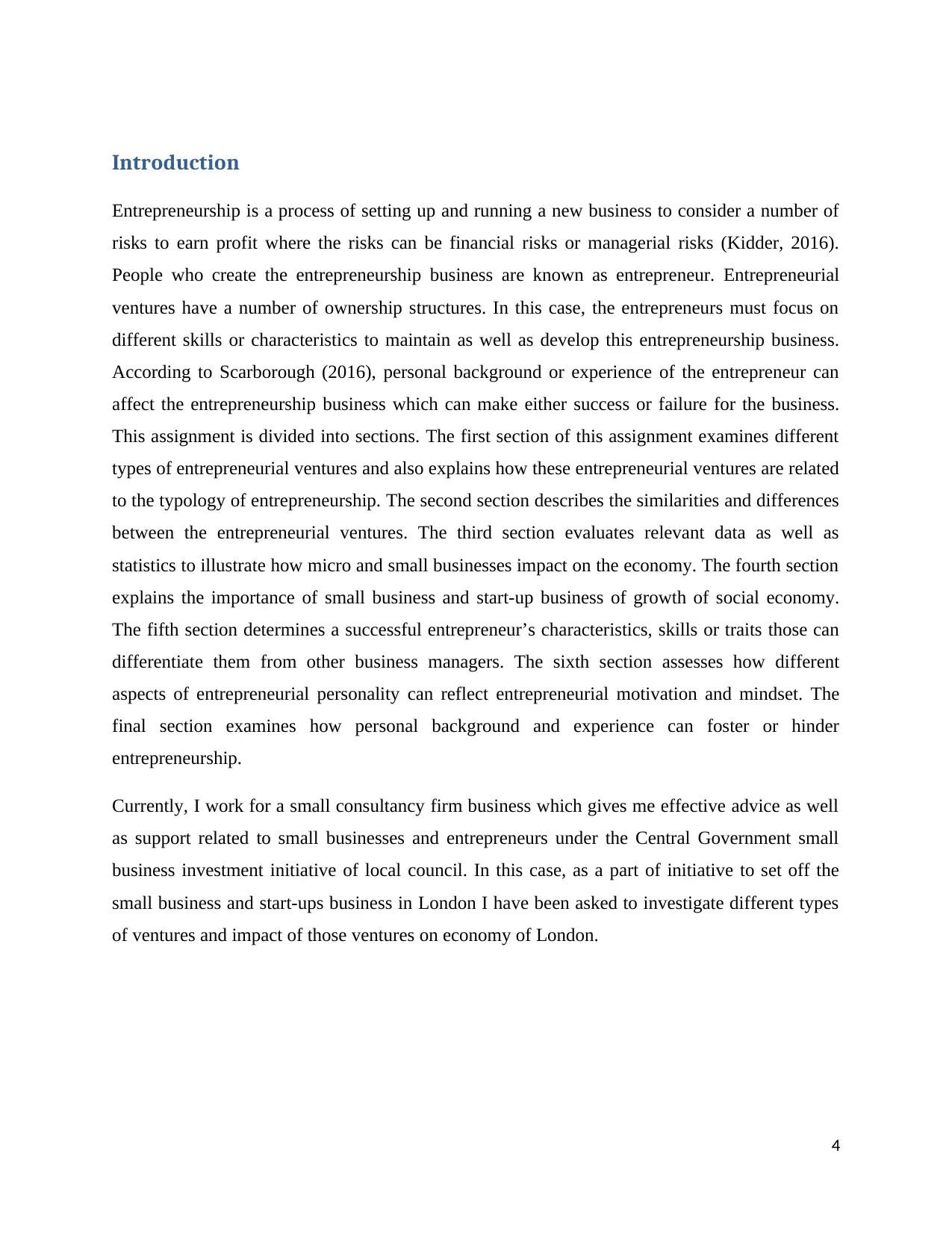
Introduction
Entrepreneurship is a process of setting up and running a new business to consider a number of
risks to earn profit where the risks can be financial risks or managerial risks (Kidder, 2016).
People who create the entrepreneurship business are known as entrepreneur. Entrepreneurial
ventures have a number of ownership structures. In this case, the entrepreneurs must focus on
different skills or characteristics to maintain as well as develop this entrepreneurship business.
According to Scarborough (2016), personal background or experience of the entrepreneur can
affect the entrepreneurship business which can make either success or failure for the business.
This assignment is divided into sections. The first section of this assignment examines different
types of entrepreneurial ventures and also explains how these entrepreneurial ventures are related
to the typology of entrepreneurship. The second section describes the similarities and differences
between the entrepreneurial ventures. The third section evaluates relevant data as well as
statistics to illustrate how micro and small businesses impact on the economy. The fourth section
explains the importance of small business and start-up business of growth of social economy.
The fifth section determines a successful entrepreneur’s characteristics, skills or traits those can
differentiate them from other business managers. The sixth section assesses how different
aspects of entrepreneurial personality can reflect entrepreneurial motivation and mindset. The
final section examines how personal background and experience can foster or hinder
entrepreneurship.
Currently, I work for a small consultancy firm business which gives me effective advice as well
as support related to small businesses and entrepreneurs under the Central Government small
business investment initiative of local council. In this case, as a part of initiative to set off the
small business and start-ups business in London I have been asked to investigate different types
of ventures and impact of those ventures on economy of London.
4
Entrepreneurship is a process of setting up and running a new business to consider a number of
risks to earn profit where the risks can be financial risks or managerial risks (Kidder, 2016).
People who create the entrepreneurship business are known as entrepreneur. Entrepreneurial
ventures have a number of ownership structures. In this case, the entrepreneurs must focus on
different skills or characteristics to maintain as well as develop this entrepreneurship business.
According to Scarborough (2016), personal background or experience of the entrepreneur can
affect the entrepreneurship business which can make either success or failure for the business.
This assignment is divided into sections. The first section of this assignment examines different
types of entrepreneurial ventures and also explains how these entrepreneurial ventures are related
to the typology of entrepreneurship. The second section describes the similarities and differences
between the entrepreneurial ventures. The third section evaluates relevant data as well as
statistics to illustrate how micro and small businesses impact on the economy. The fourth section
explains the importance of small business and start-up business of growth of social economy.
The fifth section determines a successful entrepreneur’s characteristics, skills or traits those can
differentiate them from other business managers. The sixth section assesses how different
aspects of entrepreneurial personality can reflect entrepreneurial motivation and mindset. The
final section examines how personal background and experience can foster or hinder
entrepreneurship.
Currently, I work for a small consultancy firm business which gives me effective advice as well
as support related to small businesses and entrepreneurs under the Central Government small
business investment initiative of local council. In this case, as a part of initiative to set off the
small business and start-ups business in London I have been asked to investigate different types
of ventures and impact of those ventures on economy of London.
4
Paraphrase This Document
Need a fresh take? Get an instant paraphrase of this document with our AI Paraphraser
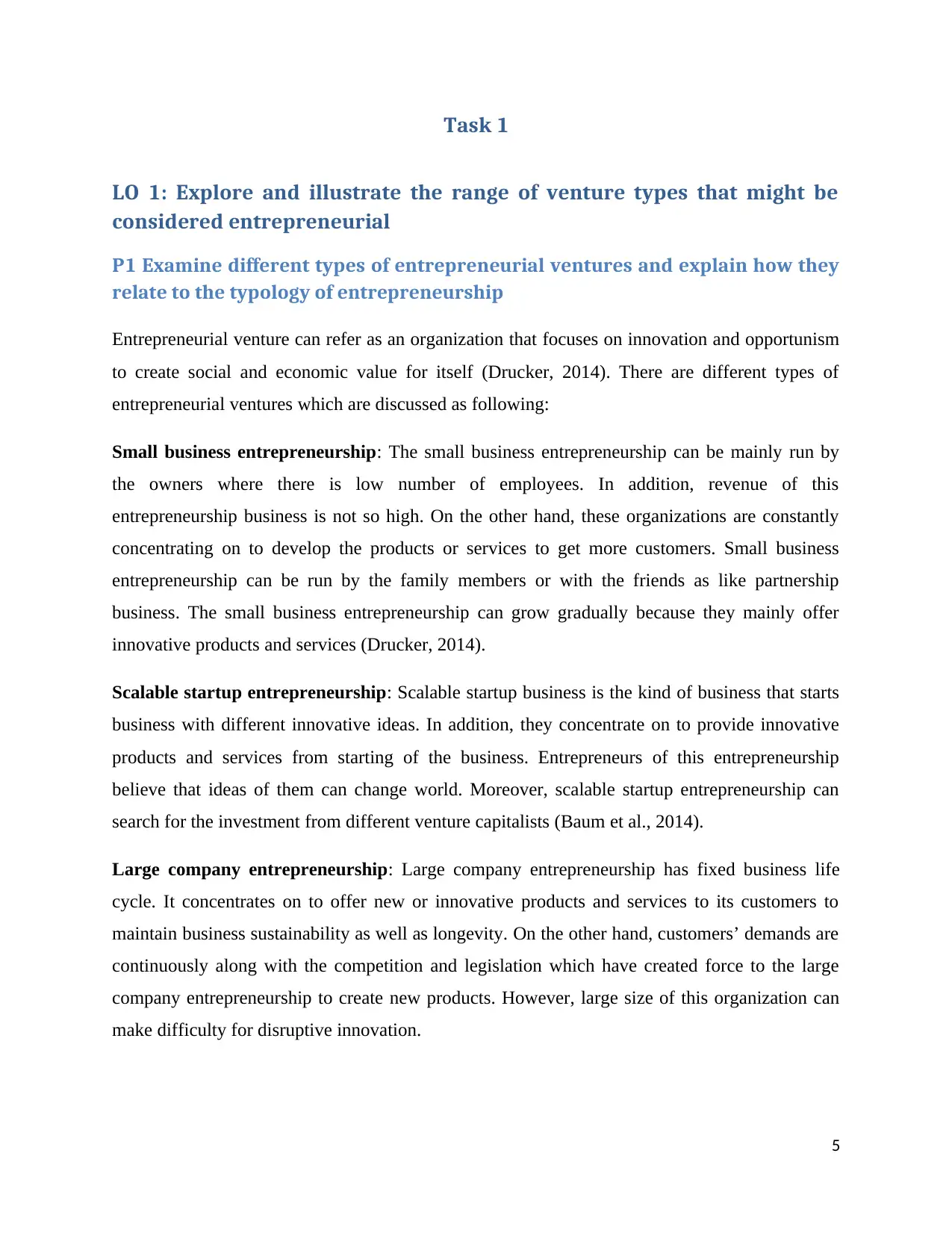
Task 1
LO 1: Explore and illustrate the range of venture types that might be
considered entrepreneurial
P1 Examine different types of entrepreneurial ventures and explain how they
relate to the typology of entrepreneurship
Entrepreneurial venture can refer as an organization that focuses on innovation and opportunism
to create social and economic value for itself (Drucker, 2014). There are different types of
entrepreneurial ventures which are discussed as following:
Small business entrepreneurship: The small business entrepreneurship can be mainly run by
the owners where there is low number of employees. In addition, revenue of this
entrepreneurship business is not so high. On the other hand, these organizations are constantly
concentrating on to develop the products or services to get more customers. Small business
entrepreneurship can be run by the family members or with the friends as like partnership
business. The small business entrepreneurship can grow gradually because they mainly offer
innovative products and services (Drucker, 2014).
Scalable startup entrepreneurship: Scalable startup business is the kind of business that starts
business with different innovative ideas. In addition, they concentrate on to provide innovative
products and services from starting of the business. Entrepreneurs of this entrepreneurship
believe that ideas of them can change world. Moreover, scalable startup entrepreneurship can
search for the investment from different venture capitalists (Baum et al., 2014).
Large company entrepreneurship: Large company entrepreneurship has fixed business life
cycle. It concentrates on to offer new or innovative products and services to its customers to
maintain business sustainability as well as longevity. On the other hand, customers’ demands are
continuously along with the competition and legislation which have created force to the large
company entrepreneurship to create new products. However, large size of this organization can
make difficulty for disruptive innovation.
5
LO 1: Explore and illustrate the range of venture types that might be
considered entrepreneurial
P1 Examine different types of entrepreneurial ventures and explain how they
relate to the typology of entrepreneurship
Entrepreneurial venture can refer as an organization that focuses on innovation and opportunism
to create social and economic value for itself (Drucker, 2014). There are different types of
entrepreneurial ventures which are discussed as following:
Small business entrepreneurship: The small business entrepreneurship can be mainly run by
the owners where there is low number of employees. In addition, revenue of this
entrepreneurship business is not so high. On the other hand, these organizations are constantly
concentrating on to develop the products or services to get more customers. Small business
entrepreneurship can be run by the family members or with the friends as like partnership
business. The small business entrepreneurship can grow gradually because they mainly offer
innovative products and services (Drucker, 2014).
Scalable startup entrepreneurship: Scalable startup business is the kind of business that starts
business with different innovative ideas. In addition, they concentrate on to provide innovative
products and services from starting of the business. Entrepreneurs of this entrepreneurship
believe that ideas of them can change world. Moreover, scalable startup entrepreneurship can
search for the investment from different venture capitalists (Baum et al., 2014).
Large company entrepreneurship: Large company entrepreneurship has fixed business life
cycle. It concentrates on to offer new or innovative products and services to its customers to
maintain business sustainability as well as longevity. On the other hand, customers’ demands are
continuously along with the competition and legislation which have created force to the large
company entrepreneurship to create new products. However, large size of this organization can
make difficulty for disruptive innovation.
5
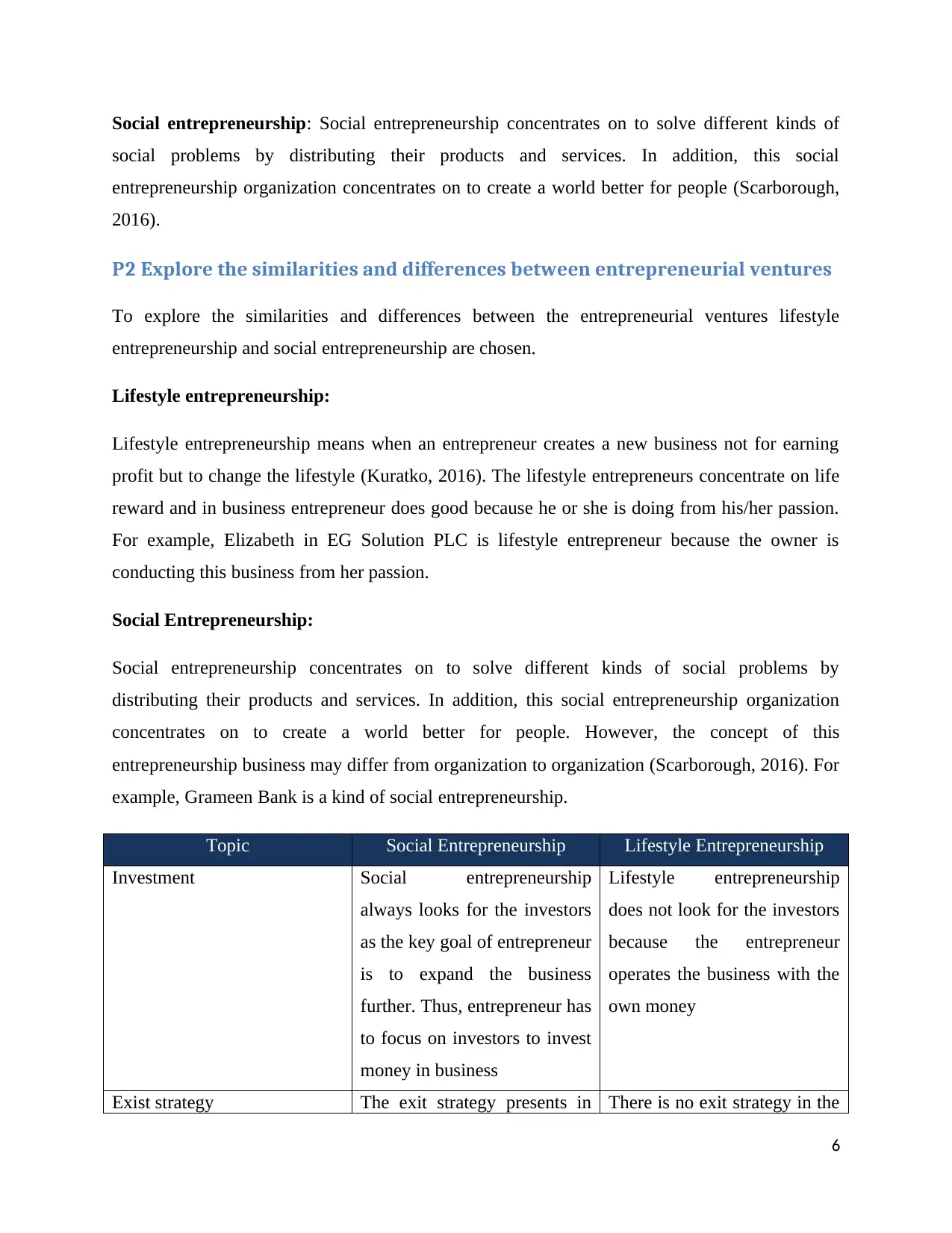
Social entrepreneurship: Social entrepreneurship concentrates on to solve different kinds of
social problems by distributing their products and services. In addition, this social
entrepreneurship organization concentrates on to create a world better for people (Scarborough,
2016).
P2 Explore the similarities and differences between entrepreneurial ventures
To explore the similarities and differences between the entrepreneurial ventures lifestyle
entrepreneurship and social entrepreneurship are chosen.
Lifestyle entrepreneurship:
Lifestyle entrepreneurship means when an entrepreneur creates a new business not for earning
profit but to change the lifestyle (Kuratko, 2016). The lifestyle entrepreneurs concentrate on life
reward and in business entrepreneur does good because he or she is doing from his/her passion.
For example, Elizabeth in EG Solution PLC is lifestyle entrepreneur because the owner is
conducting this business from her passion.
Social Entrepreneurship:
Social entrepreneurship concentrates on to solve different kinds of social problems by
distributing their products and services. In addition, this social entrepreneurship organization
concentrates on to create a world better for people. However, the concept of this
entrepreneurship business may differ from organization to organization (Scarborough, 2016). For
example, Grameen Bank is a kind of social entrepreneurship.
Topic Social Entrepreneurship Lifestyle Entrepreneurship
Investment Social entrepreneurship
always looks for the investors
as the key goal of entrepreneur
is to expand the business
further. Thus, entrepreneur has
to focus on investors to invest
money in business
Lifestyle entrepreneurship
does not look for the investors
because the entrepreneur
operates the business with the
own money
Exist strategy The exit strategy presents in There is no exit strategy in the
6
social problems by distributing their products and services. In addition, this social
entrepreneurship organization concentrates on to create a world better for people (Scarborough,
2016).
P2 Explore the similarities and differences between entrepreneurial ventures
To explore the similarities and differences between the entrepreneurial ventures lifestyle
entrepreneurship and social entrepreneurship are chosen.
Lifestyle entrepreneurship:
Lifestyle entrepreneurship means when an entrepreneur creates a new business not for earning
profit but to change the lifestyle (Kuratko, 2016). The lifestyle entrepreneurs concentrate on life
reward and in business entrepreneur does good because he or she is doing from his/her passion.
For example, Elizabeth in EG Solution PLC is lifestyle entrepreneur because the owner is
conducting this business from her passion.
Social Entrepreneurship:
Social entrepreneurship concentrates on to solve different kinds of social problems by
distributing their products and services. In addition, this social entrepreneurship organization
concentrates on to create a world better for people. However, the concept of this
entrepreneurship business may differ from organization to organization (Scarborough, 2016). For
example, Grameen Bank is a kind of social entrepreneurship.
Topic Social Entrepreneurship Lifestyle Entrepreneurship
Investment Social entrepreneurship
always looks for the investors
as the key goal of entrepreneur
is to expand the business
further. Thus, entrepreneur has
to focus on investors to invest
money in business
Lifestyle entrepreneurship
does not look for the investors
because the entrepreneur
operates the business with the
own money
Exist strategy The exit strategy presents in There is no exit strategy in the
6
⊘ This is a preview!⊘
Do you want full access?
Subscribe today to unlock all pages.

Trusted by 1+ million students worldwide
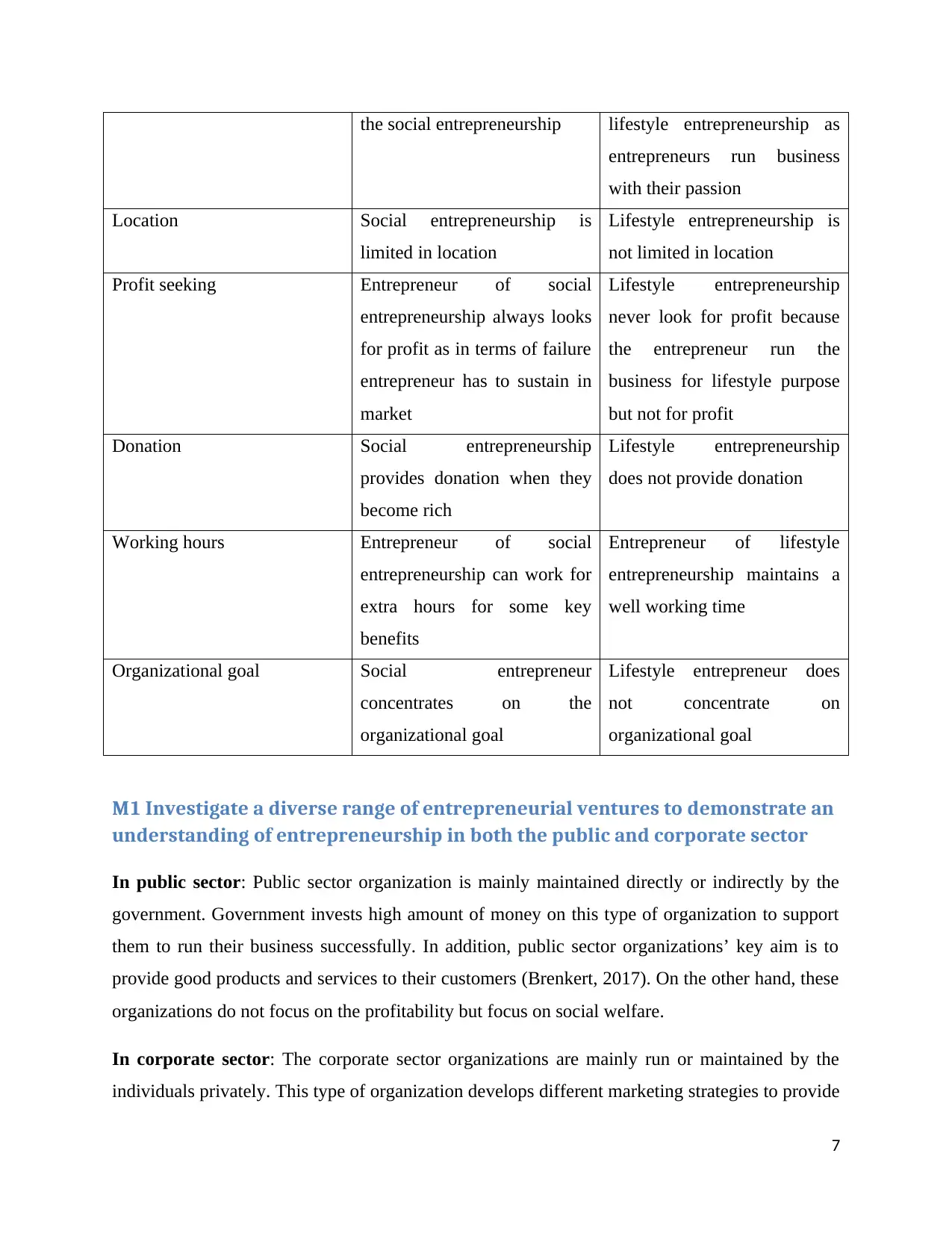
the social entrepreneurship lifestyle entrepreneurship as
entrepreneurs run business
with their passion
Location Social entrepreneurship is
limited in location
Lifestyle entrepreneurship is
not limited in location
Profit seeking Entrepreneur of social
entrepreneurship always looks
for profit as in terms of failure
entrepreneur has to sustain in
market
Lifestyle entrepreneurship
never look for profit because
the entrepreneur run the
business for lifestyle purpose
but not for profit
Donation Social entrepreneurship
provides donation when they
become rich
Lifestyle entrepreneurship
does not provide donation
Working hours Entrepreneur of social
entrepreneurship can work for
extra hours for some key
benefits
Entrepreneur of lifestyle
entrepreneurship maintains a
well working time
Organizational goal Social entrepreneur
concentrates on the
organizational goal
Lifestyle entrepreneur does
not concentrate on
organizational goal
M1 Investigate a diverse range of entrepreneurial ventures to demonstrate an
understanding of entrepreneurship in both the public and corporate sector
In public sector: Public sector organization is mainly maintained directly or indirectly by the
government. Government invests high amount of money on this type of organization to support
them to run their business successfully. In addition, public sector organizations’ key aim is to
provide good products and services to their customers (Brenkert, 2017). On the other hand, these
organizations do not focus on the profitability but focus on social welfare.
In corporate sector: The corporate sector organizations are mainly run or maintained by the
individuals privately. This type of organization develops different marketing strategies to provide
7
entrepreneurs run business
with their passion
Location Social entrepreneurship is
limited in location
Lifestyle entrepreneurship is
not limited in location
Profit seeking Entrepreneur of social
entrepreneurship always looks
for profit as in terms of failure
entrepreneur has to sustain in
market
Lifestyle entrepreneurship
never look for profit because
the entrepreneur run the
business for lifestyle purpose
but not for profit
Donation Social entrepreneurship
provides donation when they
become rich
Lifestyle entrepreneurship
does not provide donation
Working hours Entrepreneur of social
entrepreneurship can work for
extra hours for some key
benefits
Entrepreneur of lifestyle
entrepreneurship maintains a
well working time
Organizational goal Social entrepreneur
concentrates on the
organizational goal
Lifestyle entrepreneur does
not concentrate on
organizational goal
M1 Investigate a diverse range of entrepreneurial ventures to demonstrate an
understanding of entrepreneurship in both the public and corporate sector
In public sector: Public sector organization is mainly maintained directly or indirectly by the
government. Government invests high amount of money on this type of organization to support
them to run their business successfully. In addition, public sector organizations’ key aim is to
provide good products and services to their customers (Brenkert, 2017). On the other hand, these
organizations do not focus on the profitability but focus on social welfare.
In corporate sector: The corporate sector organizations are mainly run or maintained by the
individuals privately. This type of organization develops different marketing strategies to provide
7
Paraphrase This Document
Need a fresh take? Get an instant paraphrase of this document with our AI Paraphraser
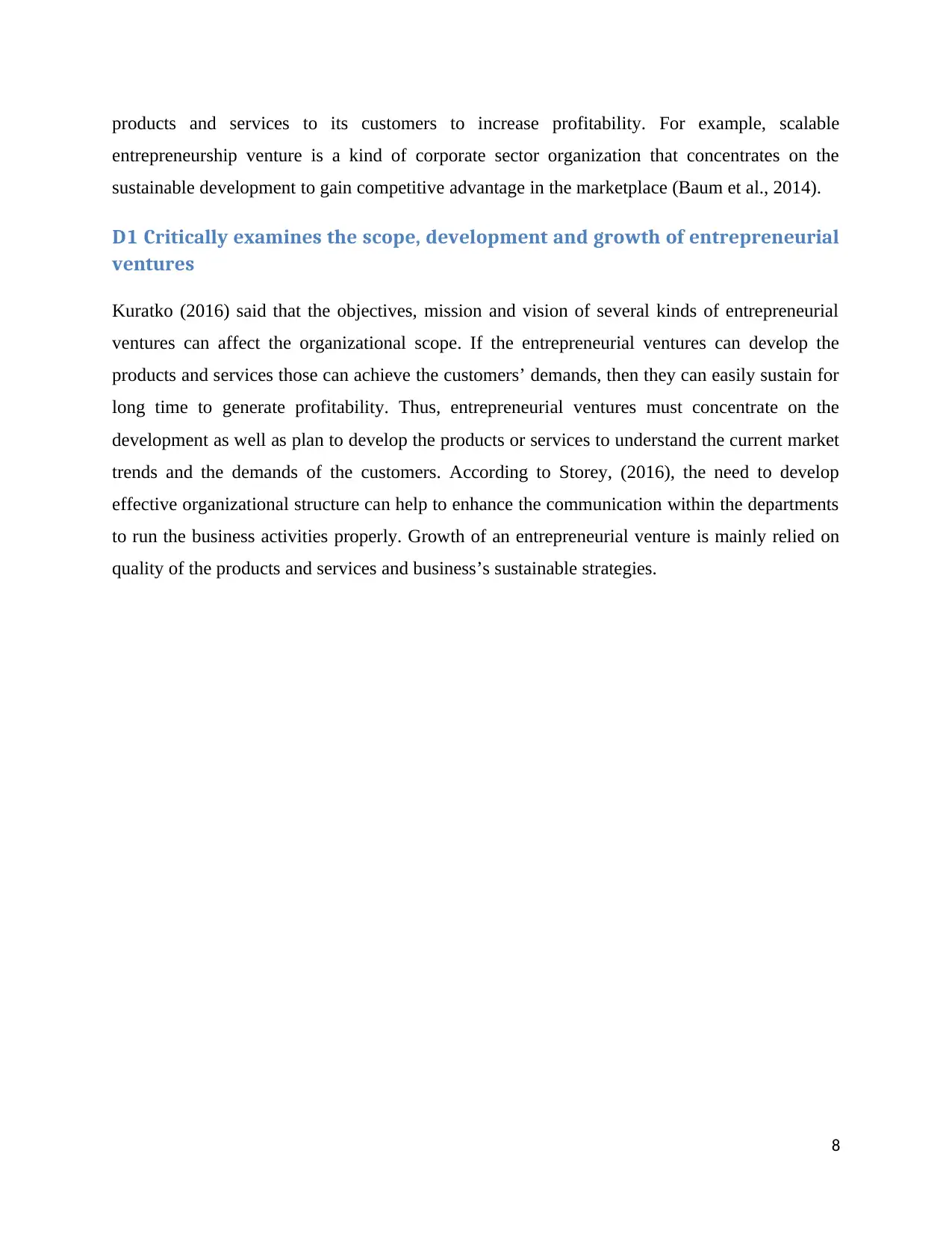
products and services to its customers to increase profitability. For example, scalable
entrepreneurship venture is a kind of corporate sector organization that concentrates on the
sustainable development to gain competitive advantage in the marketplace (Baum et al., 2014).
D1 Critically examines the scope, development and growth of entrepreneurial
ventures
Kuratko (2016) said that the objectives, mission and vision of several kinds of entrepreneurial
ventures can affect the organizational scope. If the entrepreneurial ventures can develop the
products and services those can achieve the customers’ demands, then they can easily sustain for
long time to generate profitability. Thus, entrepreneurial ventures must concentrate on the
development as well as plan to develop the products or services to understand the current market
trends and the demands of the customers. According to Storey, (2016), the need to develop
effective organizational structure can help to enhance the communication within the departments
to run the business activities properly. Growth of an entrepreneurial venture is mainly relied on
quality of the products and services and business’s sustainable strategies.
8
entrepreneurship venture is a kind of corporate sector organization that concentrates on the
sustainable development to gain competitive advantage in the marketplace (Baum et al., 2014).
D1 Critically examines the scope, development and growth of entrepreneurial
ventures
Kuratko (2016) said that the objectives, mission and vision of several kinds of entrepreneurial
ventures can affect the organizational scope. If the entrepreneurial ventures can develop the
products and services those can achieve the customers’ demands, then they can easily sustain for
long time to generate profitability. Thus, entrepreneurial ventures must concentrate on the
development as well as plan to develop the products or services to understand the current market
trends and the demands of the customers. According to Storey, (2016), the need to develop
effective organizational structure can help to enhance the communication within the departments
to run the business activities properly. Growth of an entrepreneurial venture is mainly relied on
quality of the products and services and business’s sustainable strategies.
8
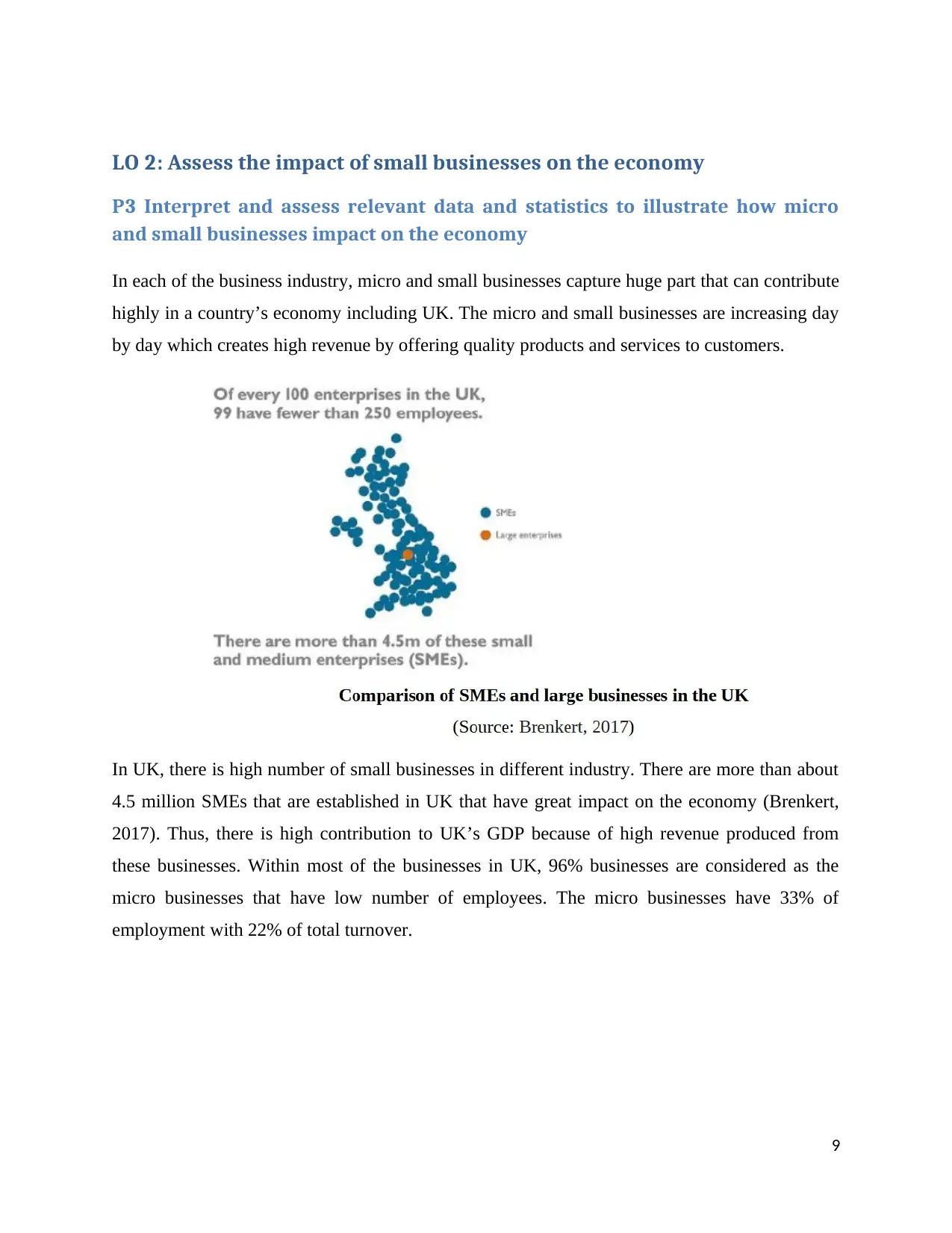
LO 2: Assess the impact of small businesses on the economy
P3 Interpret and assess relevant data and statistics to illustrate how micro
and small businesses impact on the economy
In each of the business industry, micro and small businesses capture huge part that can contribute
highly in a country’s economy including UK. The micro and small businesses are increasing day
by day which creates high revenue by offering quality products and services to customers.
In UK, there is high number of small businesses in different industry. There are more than about
4.5 million SMEs that are established in UK that have great impact on the economy (Brenkert,
2017). Thus, there is high contribution to UK’s GDP because of high revenue produced from
these businesses. Within most of the businesses in UK, 96% businesses are considered as the
micro businesses that have low number of employees. The micro businesses have 33% of
employment with 22% of total turnover.
9
P3 Interpret and assess relevant data and statistics to illustrate how micro
and small businesses impact on the economy
In each of the business industry, micro and small businesses capture huge part that can contribute
highly in a country’s economy including UK. The micro and small businesses are increasing day
by day which creates high revenue by offering quality products and services to customers.
In UK, there is high number of small businesses in different industry. There are more than about
4.5 million SMEs that are established in UK that have great impact on the economy (Brenkert,
2017). Thus, there is high contribution to UK’s GDP because of high revenue produced from
these businesses. Within most of the businesses in UK, 96% businesses are considered as the
micro businesses that have low number of employees. The micro businesses have 33% of
employment with 22% of total turnover.
9
⊘ This is a preview!⊘
Do you want full access?
Subscribe today to unlock all pages.

Trusted by 1+ million students worldwide
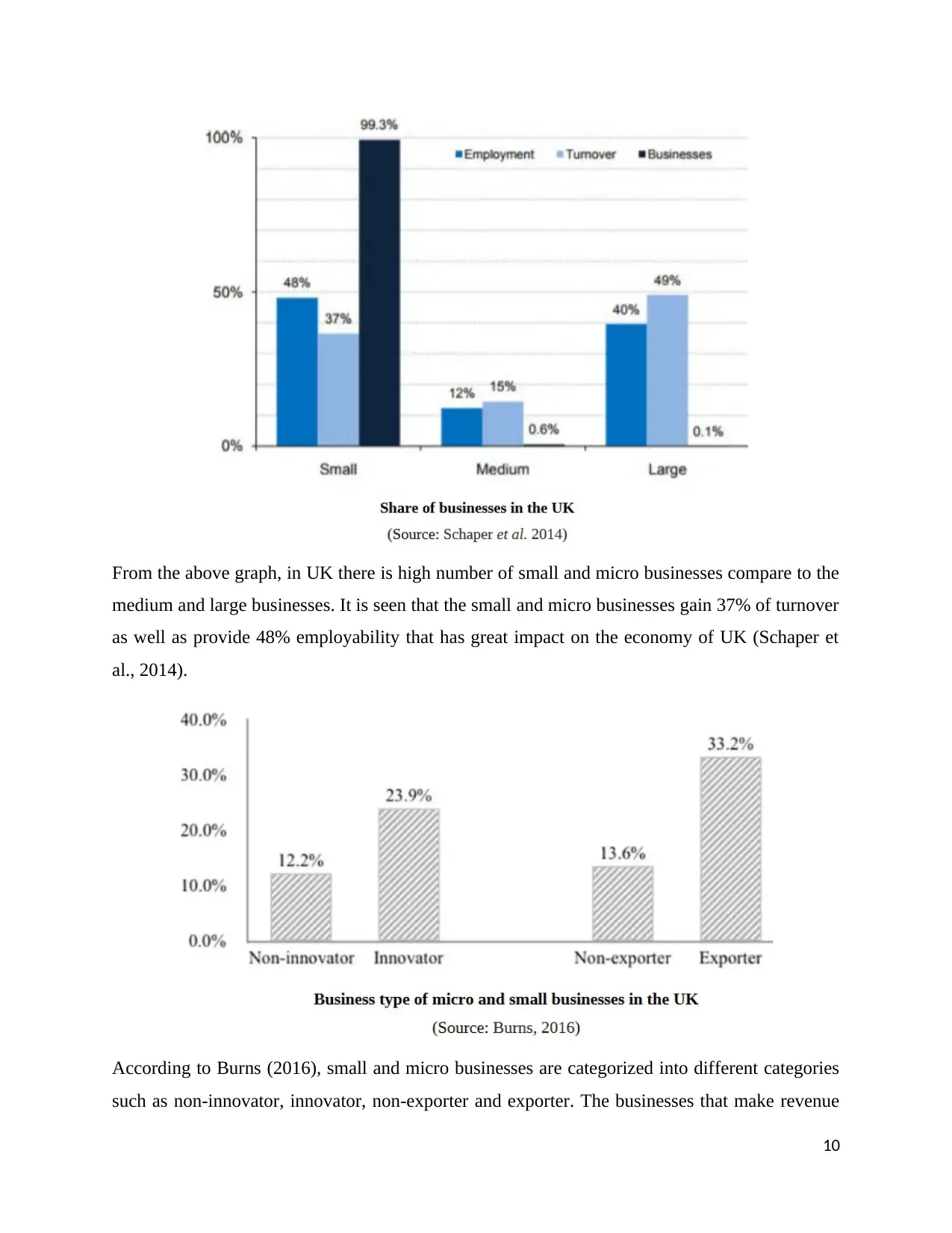
From the above graph, in UK there is high number of small and micro businesses compare to the
medium and large businesses. It is seen that the small and micro businesses gain 37% of turnover
as well as provide 48% employability that has great impact on the economy of UK (Schaper et
al., 2014).
According to Burns (2016), small and micro businesses are categorized into different categories
such as non-innovator, innovator, non-exporter and exporter. The businesses that make revenue
10
medium and large businesses. It is seen that the small and micro businesses gain 37% of turnover
as well as provide 48% employability that has great impact on the economy of UK (Schaper et
al., 2014).
According to Burns (2016), small and micro businesses are categorized into different categories
such as non-innovator, innovator, non-exporter and exporter. The businesses that make revenue
10
Paraphrase This Document
Need a fresh take? Get an instant paraphrase of this document with our AI Paraphraser
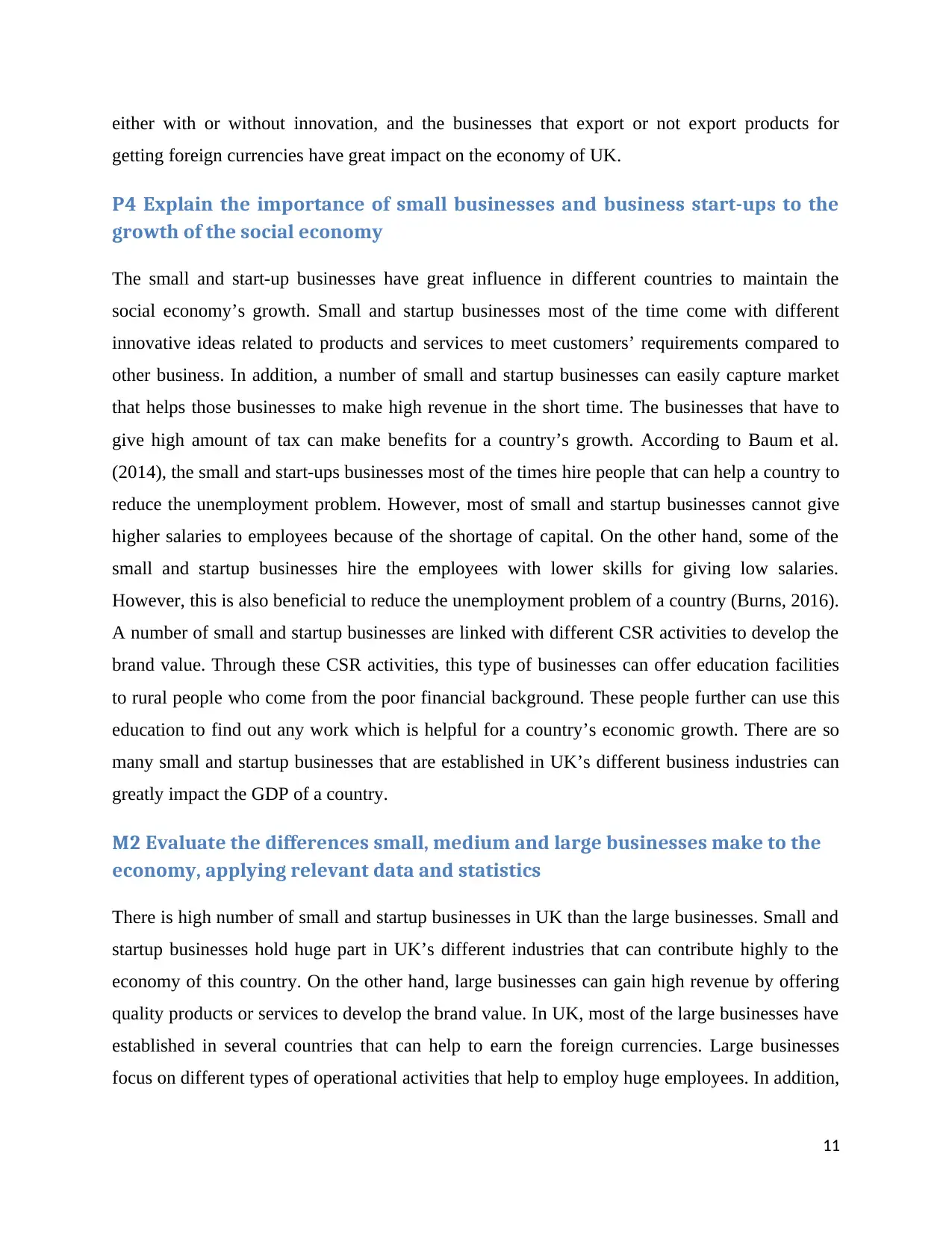
either with or without innovation, and the businesses that export or not export products for
getting foreign currencies have great impact on the economy of UK.
P4 Explain the importance of small businesses and business start-ups to the
growth of the social economy
The small and start-up businesses have great influence in different countries to maintain the
social economy’s growth. Small and startup businesses most of the time come with different
innovative ideas related to products and services to meet customers’ requirements compared to
other business. In addition, a number of small and startup businesses can easily capture market
that helps those businesses to make high revenue in the short time. The businesses that have to
give high amount of tax can make benefits for a country’s growth. According to Baum et al.
(2014), the small and start-ups businesses most of the times hire people that can help a country to
reduce the unemployment problem. However, most of small and startup businesses cannot give
higher salaries to employees because of the shortage of capital. On the other hand, some of the
small and startup businesses hire the employees with lower skills for giving low salaries.
However, this is also beneficial to reduce the unemployment problem of a country (Burns, 2016).
A number of small and startup businesses are linked with different CSR activities to develop the
brand value. Through these CSR activities, this type of businesses can offer education facilities
to rural people who come from the poor financial background. These people further can use this
education to find out any work which is helpful for a country’s economic growth. There are so
many small and startup businesses that are established in UK’s different business industries can
greatly impact the GDP of a country.
M2 Evaluate the differences small, medium and large businesses make to the
economy, applying relevant data and statistics
There is high number of small and startup businesses in UK than the large businesses. Small and
startup businesses hold huge part in UK’s different industries that can contribute highly to the
economy of this country. On the other hand, large businesses can gain high revenue by offering
quality products or services to develop the brand value. In UK, most of the large businesses have
established in several countries that can help to earn the foreign currencies. Large businesses
focus on different types of operational activities that help to employ huge employees. In addition,
11
getting foreign currencies have great impact on the economy of UK.
P4 Explain the importance of small businesses and business start-ups to the
growth of the social economy
The small and start-up businesses have great influence in different countries to maintain the
social economy’s growth. Small and startup businesses most of the time come with different
innovative ideas related to products and services to meet customers’ requirements compared to
other business. In addition, a number of small and startup businesses can easily capture market
that helps those businesses to make high revenue in the short time. The businesses that have to
give high amount of tax can make benefits for a country’s growth. According to Baum et al.
(2014), the small and start-ups businesses most of the times hire people that can help a country to
reduce the unemployment problem. However, most of small and startup businesses cannot give
higher salaries to employees because of the shortage of capital. On the other hand, some of the
small and startup businesses hire the employees with lower skills for giving low salaries.
However, this is also beneficial to reduce the unemployment problem of a country (Burns, 2016).
A number of small and startup businesses are linked with different CSR activities to develop the
brand value. Through these CSR activities, this type of businesses can offer education facilities
to rural people who come from the poor financial background. These people further can use this
education to find out any work which is helpful for a country’s economic growth. There are so
many small and startup businesses that are established in UK’s different business industries can
greatly impact the GDP of a country.
M2 Evaluate the differences small, medium and large businesses make to the
economy, applying relevant data and statistics
There is high number of small and startup businesses in UK than the large businesses. Small and
startup businesses hold huge part in UK’s different industries that can contribute highly to the
economy of this country. On the other hand, large businesses can gain high revenue by offering
quality products or services to develop the brand value. In UK, most of the large businesses have
established in several countries that can help to earn the foreign currencies. Large businesses
focus on different types of operational activities that help to employ huge employees. In addition,
11
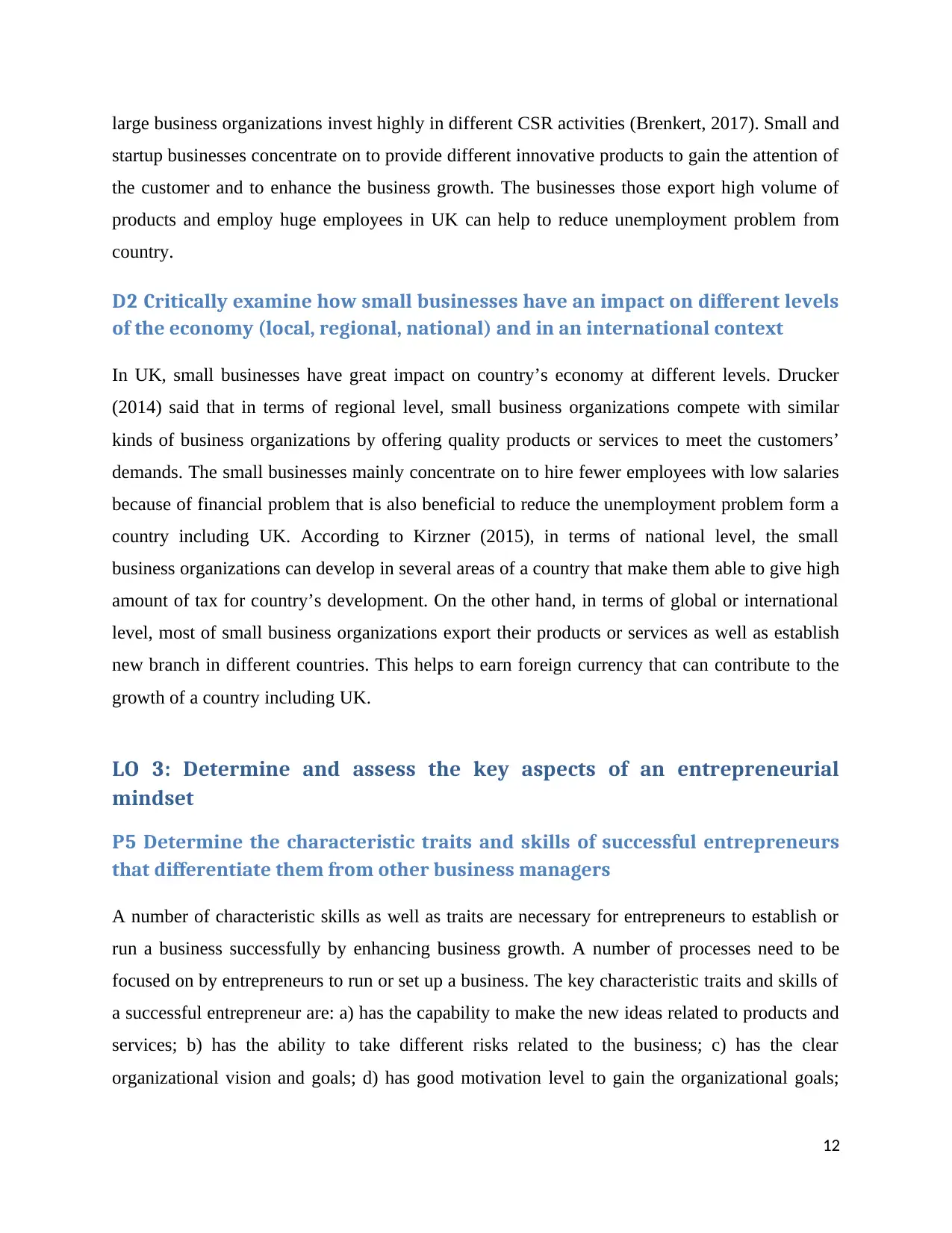
large business organizations invest highly in different CSR activities (Brenkert, 2017). Small and
startup businesses concentrate on to provide different innovative products to gain the attention of
the customer and to enhance the business growth. The businesses those export high volume of
products and employ huge employees in UK can help to reduce unemployment problem from
country.
D2 Critically examine how small businesses have an impact on different levels
of the economy (local, regional, national) and in an international context
In UK, small businesses have great impact on country’s economy at different levels. Drucker
(2014) said that in terms of regional level, small business organizations compete with similar
kinds of business organizations by offering quality products or services to meet the customers’
demands. The small businesses mainly concentrate on to hire fewer employees with low salaries
because of financial problem that is also beneficial to reduce the unemployment problem form a
country including UK. According to Kirzner (2015), in terms of national level, the small
business organizations can develop in several areas of a country that make them able to give high
amount of tax for country’s development. On the other hand, in terms of global or international
level, most of small business organizations export their products or services as well as establish
new branch in different countries. This helps to earn foreign currency that can contribute to the
growth of a country including UK.
LO 3: Determine and assess the key aspects of an entrepreneurial
mindset
P5 Determine the characteristic traits and skills of successful entrepreneurs
that differentiate them from other business managers
A number of characteristic skills as well as traits are necessary for entrepreneurs to establish or
run a business successfully by enhancing business growth. A number of processes need to be
focused on by entrepreneurs to run or set up a business. The key characteristic traits and skills of
a successful entrepreneur are: a) has the capability to make the new ideas related to products and
services; b) has the ability to take different risks related to the business; c) has the clear
organizational vision and goals; d) has good motivation level to gain the organizational goals;
12
startup businesses concentrate on to provide different innovative products to gain the attention of
the customer and to enhance the business growth. The businesses those export high volume of
products and employ huge employees in UK can help to reduce unemployment problem from
country.
D2 Critically examine how small businesses have an impact on different levels
of the economy (local, regional, national) and in an international context
In UK, small businesses have great impact on country’s economy at different levels. Drucker
(2014) said that in terms of regional level, small business organizations compete with similar
kinds of business organizations by offering quality products or services to meet the customers’
demands. The small businesses mainly concentrate on to hire fewer employees with low salaries
because of financial problem that is also beneficial to reduce the unemployment problem form a
country including UK. According to Kirzner (2015), in terms of national level, the small
business organizations can develop in several areas of a country that make them able to give high
amount of tax for country’s development. On the other hand, in terms of global or international
level, most of small business organizations export their products or services as well as establish
new branch in different countries. This helps to earn foreign currency that can contribute to the
growth of a country including UK.
LO 3: Determine and assess the key aspects of an entrepreneurial
mindset
P5 Determine the characteristic traits and skills of successful entrepreneurs
that differentiate them from other business managers
A number of characteristic skills as well as traits are necessary for entrepreneurs to establish or
run a business successfully by enhancing business growth. A number of processes need to be
focused on by entrepreneurs to run or set up a business. The key characteristic traits and skills of
a successful entrepreneur are: a) has the capability to make the new ideas related to products and
services; b) has the ability to take different risks related to the business; c) has the clear
organizational vision and goals; d) has good motivation level to gain the organizational goals;
12
⊘ This is a preview!⊘
Do you want full access?
Subscribe today to unlock all pages.

Trusted by 1+ million students worldwide
1 out of 17
Related Documents
Your All-in-One AI-Powered Toolkit for Academic Success.
+13062052269
info@desklib.com
Available 24*7 on WhatsApp / Email
![[object Object]](/_next/static/media/star-bottom.7253800d.svg)
Unlock your academic potential
Copyright © 2020–2025 A2Z Services. All Rights Reserved. Developed and managed by ZUCOL.



